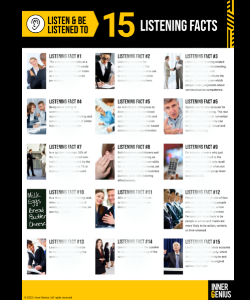World Listening Day draws attention to how humans can listen to the world around us. July 18 is the day for the global listening celebration - the birthday of R. Murray Schafer, a Canadian composer and one of the founders of the movement of
Acoustic Ecology.
Effective listening skills are crucial to successful communication, yet many of us face challenges in becoming truly active listeners.
Listening Fact:
The problem is mainly caused by the fact that we think much faster than we talk. The average person talks at a rate of about 125 – 175 words per minute, but we can listen at a rate of up to 450 words per minute. 
To read the full 15 thought-provoking Listening Facts - Click the Image above to download the document.
Listening is vital; people are not just talking to you; they are trying to get a message across. Unfortunately, in a world full of distractions, you may find yourself not listening as well as you should. Perhaps you're not listening to your boss. You're not listening to your team. You're not listening to your children. You're not listening to your partner. Maybe, you're not even listening to your own thoughts!
Listening is a true asset for progressive business professionals who reap the rewards in better connections, relationships, and superior communication.
The most basic principle of hearing is physiological. Listening is psychological and is a skill that can be sharpened. The road from the speaker's intention to the listener who has to decipher the message is full of several blocks and barriers.
-
Pseudo Listening is pretending to listen. This may be listening to another conversation in the room or thinking about something else.
-
Scoring Points is relating everything we hear to our own experience. You might hear someone scoring points respond to what they've heard, saying… "Oh! That's nothing. Wait till you hear what happened to me last week".
-
Mind Reading is predicting what the other person is really thinking. For example, saying to ourselves - "I bet that's not the real reason she came here."
-
Rehearsing is practicing what we will say next - preparing a clever or witty response and missing what is being said.
-
Cherry Picking is listening for a critical piece of information and then switching off. Hearing only what you want to hear.
For many adult learners, their sense of hearing is their preferred option for taking new information. This is because they learn best and fastest by hearing. According to Inner Genius, this is called Auditory Brain Fuel. Four Inner Genius Archetypes prefer to take in new information via their sense of hearing: The Narrator, The Valedictorian, The Composer, and The Energizer.
Do you want to know what your own brain fuel is? Learn more about Inner Genius Quotient.

Listen to your Language. If you hear yourself saying words like these, chances are you prefer taking in new information through your sense of hearing:
- I hear what you say
- Who sets the tone?
- This is in harmony with…
- A telling sign
- That rings a bell
Your life has a soundtrack. You connect to your world through sound and rhythm, the spoken word, and listening to and collaborating with experts. Your Brain Fuel takes things off the page and communicates them via the airwaves. Here's how those with Auditory Brain Fuel can instantly get into the Genius Zone:
- You love a good story. Actively look for podcasts or interviews with inspiring people who align with your goals.
- Make up a catchy rhyme or routine to help you keep something top of mind.
- Talk to others before you do something new or when you hit a roadblock.
- Find a community and connect with others that have similar interests to you.
- Share your ideas and learn from theirs.
Active listening is a skill that is often overlooked by most people. We often worry about our own thoughts and ideas, but we need to learn how to listen more. As we said above, the average person talks at a rate of about 125 – 175 words per minute, but we can listen at a rate of up to 450 words per minute. This means that in a five-minute conversation, a person might only say 250 words. If you're not listening, and getting information from your conversation, then you're missing out. Active listening is the ability to absorb what your conversation partner is saying and to ask questions.
It might seem logical to slow down our thinking when we listen, but slowing down thought processes seems to be a challenging thing to do. When we hear, we continue thinking at high speed while the spoken words arrive at low speed.
Active listening can make all the difference in creating a successful connection and collaboration. Here's how...
-
Acknowledge that you could do better
Studies show that awareness alone is one of the greatest contributors to improved listening. Some experts claim that "50% or more of the average adult's potential improvement in listening can come from realizing he or she has bad listening habits and is capable of listening much better."
-
Practice listening
Once you've established that you need to be a better listener, catch yourself out when you are not listening. Focus on your listening activity, and you'll begin to see listening as a conscious act. You are then in a better position to practice active listening skills.
-
Take notes
Note-taking can be very useful. It also keeps you occupied, making you less likely to interrupt or daydream. Taking notes is a natural strength of four of the 12 Inner Genius Archetypes. You're probably a notetaker if you are The Decrypter, The Scribe, The Cartographer or the Futurist.
-
Resolve not to let your mind wander
If you are prone to drifting while listening, make a quick note to come back to your thoughts later. This makes it easier to stay in the 'here and now' and ensures that you resume paying attention.
-
Set the scene for active listening
Don't let unwelcome distractions compete for your attention. Switch off notifications or turn off sound of the running apps. Book a meeting room, find a quiet corner, or go outside for a walk. Not only is this good practice and a welcome break from 'corporate chaos', it provides an optimal environment free from distractions.
What will you do to be in harmony with World Listening Day? Here are two challenges to increase your skills in active listening, focus, and connection:
-
- According to the longest-running survey of digital media consumer behavior in America in 2021, it's estimated that 162 million US citizens older than 12 have listened to a podcast. In 2006, it was merely 11 million. The industry grew alongside the evolution of smartphones, smart speakers (Amazon Alexa, Google Home, etc.), and other entertainment systems. Once you've unlocked your Inner Genius Archetype, you'll have access to Alexa to receive your daily dose of the words that help you bring your communication to a new level.
-
- Download the 15 Listening Facts ready for your next team meeting. Then, be on the leading edge by brainstorming ways you and your team can commit to sharpening listening skills.

To read the full 15 thought-provoking Listening Facts - Click the Image above to download the document.
Listening is not only an essential skill we use on a daily basis at work or in our private interactions. It is also one of the ways how we process and learn new information. Assess your own listening skills and abilities to get into your Genius Zone. How could you evolve and transform your listening?
The Inner Genius program is designed to unlock the paths for you to better know your preferred style and adapt it to achieve the best outcome with people who may have other learning and communication preferences, thus offering an indefinite field for improving your human and professional potential.






